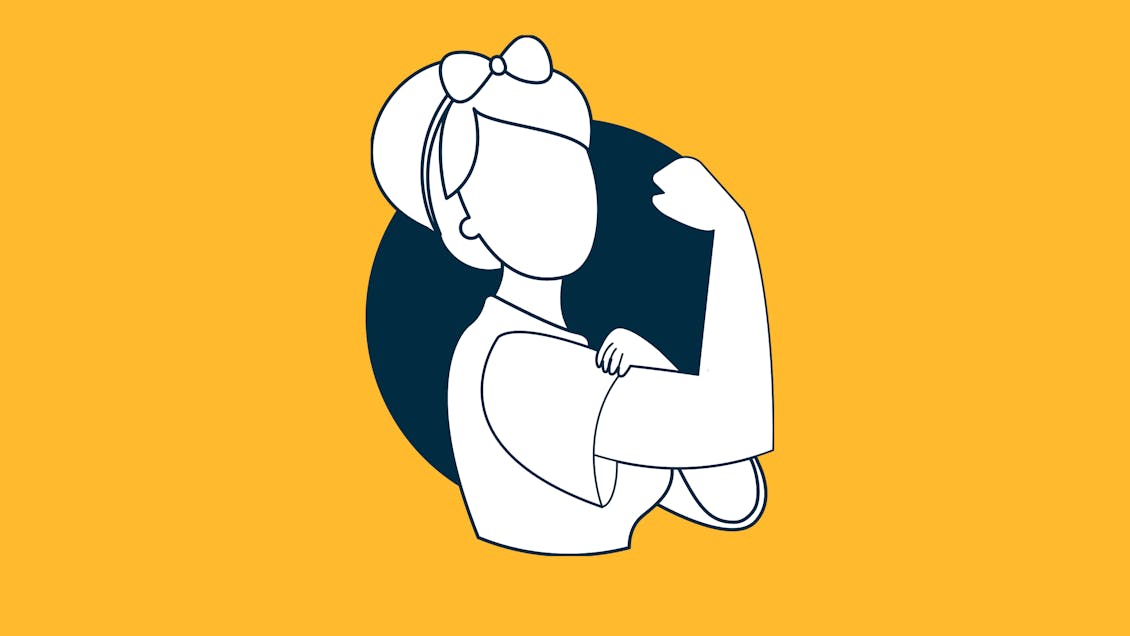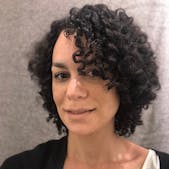Listen Up: What Women’s History Month Means to Women at Modus

Giving agency to voices at our agency
Annual recognition of Women’s History Month and International Women’s Day (March 8) may seem like another nice thing that companies today should do. And it is! But it’s also an opportunity to remind ourselves of the power that workplaces hold to shift historical constructs and narratives.
Women continue to be underrepresented in the technology sector — about 25% of tech jobs are held by women. At Modus, we feel good about our gender representation. Our current gender demographics are: male (49%), female (45%), unspecified (3%), non-binary (3%). We are proud to be a global agency where differences are valued and celebrated.
As we strive to empower women in our field and foster a culture of diversity, equity, inclusion and accessibility, we are taking a moment to amplify some of the women at Modus. Why? Because Women’s History Month is a time to listen to women and learn. And truly, that’s something we can do all year long.
What was your journey to working at a digital agency? What do you like most about it?
“Growing up bilingual, I thought a lot about communication and how we can facilitate understanding. While studying Visual Communications in school, I became interested in creating digital products and services that help build knowledge and improve people's lives.” — Tae Sayama, VP, Experience Design
“My father was an inventor and pioneer at the intersection of art and technology, so it feels natural to me to live and work at this intersection. I like that it is inherently creative, that no matter what you are working to achieve in terms of technology, you will always be working through the medium of humans.” — Lorrie Harrison, Director, People Operations
“I have predominately worked in tech post college. I always appreciated that there was room to grow both on the financial side and develop my skillset. Working in tech, there's always something new to learn and new trends to follow, so it keeps my days interesting.” — Mia Cross, Marketing Project Manager
“I came to work in the IT industry through my foreign languages background. A Digital Marketing company I worked for in the past was looking for a PM with my language combination (Italian, Spanish and English) and I was the right fit. Once in the job I realized that I really enjoyed the technical part of it, which included using a CMS to upload content on their site, testing if it worked correctly, using many different SaaS tools, and so on. I currently still enjoy working with dev teams because I am very curious to know how things work.” — Giulia Galeazzi, Project Coordinator
“At the beginning of the internet boom, I packed up my bags, drove cross-country, and moved to San Francisco to be close to my great aunt who was terminally ill and alone. It was 1998 and I had been working on some really cool GIS and statistical modeling applications with the Atlanta Regional Commission. I thought I would weasel my way into another government job, but when I saw what was happening in "the Valley" I could not wait to be a part of the creative spirit of that time. I learned some Java, doubled down on my database skills, and joined a startup. I have loved everything about the processes and systems behind building software and applications ever since.” — Kristina Vogel, Chief Operating Officer
What advice would you give a young woman breaking into this industry?
“Become an expert at something you would love doing for free.” — Ruby Tugade, VP, Business Development
“Find ways of networking that work for your personality. It's hard to reach out to someone you don't know (and sometimes, even to the people you do know!), but the worst they can do is ignore you. There will be people out there who are willing to help.” — Regina Hong, UX Researcher
“Know your strengths and what you bring to the table. Listen and learn from others. Always be collaborative and supportive.” — Kim Sawyer, Growth Marketing Manager
“Especially in this day and age of Zoom calls, it can be easy to stay on mute and let others talk. If you're not comfortable speaking up in meetings, find a mentor you can meet one-on-one to bounce ideas off of and gain confidence.” — Selena Ricks, Brand and Marketing Communications Lead
“Get involved. Find a mentor. Take risks.” — Kristina
Tell us about a woman you look up to and why.
“Without a doubt, my mom. My parents had us four kids all within 2-3 years apart, and while raising us, my mom worked her way up in the hospital she's been at for the last 30-plus years, and still had the energy to be our tutor, our therapist, our mediator, our coach, and just be the best mom ever. Even after 30+ years, she's still constantly trying to improve, learn, and be an even better leader for her team. She's killed it in motherhood but also in her professional life as well. She rarely takes sick days, she wakes up earlier than almost anyone I know, she's one of the most driven people I've ever met, and I strive to be like her every single day.” — Mia
“There are so many, but specifically in this case, I look up to a former colleague and counterpart. She took on a male-dominated industry with such determination to adjust the way things were done from bringing in more women to the industry to ensuring there was more access to support and mentoring.“ — Kim
“I look up to my grandmother who pursued an academic career at a time most women did not. She was fearless, she asked bold and sometimes audacious questions. She did not try to conform or model herself in a way to please the patriarchy. I like that she was sympathetic to all of us — male, female, non-binary — who live in relation to the patriarchal system, and that she encouraged me, her colleagues, students, family, and friends to stay curious and grounded in facts and forgiveness.” — Lorrie
“The woman that I admire the most is my mother. She arrived in the U.S. from the Philippines in her 20s as a CPA professional with big dreams of adventure and creating and living a great life here. I think that took so much bravery and heart, and I am forever grateful to her (and my father) for having done so. That decision alone built a new legacy in our large and deep family history, and continues to positively impact the trajectory of our lives.” — Ruby
“Linda Prowse-Fostler. Linda is my aunt and mentor. She is/was a quiet giant in the silicon chip business in Silicon Valley in the ‘70s, ‘80, ‘90s, and 2000s.” — Kristina
“I greatly look up to my female college professors (Professors Anju Paul, Claudine Ang, Nozomi Naoi, and Naoko Shimazu) in my undergraduate alma mater, Yale-NUS College. They have imparted key lessons on care, dedication, the value and price of emotional labor, and not settling for what is offered, but striving for what you want.” — Regina
“Vice President Kamala Harris, who broke several glass ceilings. Kamala says ‘never ask for permission to lead.’” — Selena
What does International Women’s Day mean to you?
“International Women's Day is about equality for women, from equal pay to basic rights. From a professional perspective, it means shining a spotlight on the amazing women that lead companies, push projects forward, lead households and lead nations.” — Kim
“To me, it means that we're bringing attention to the women who ultimately didn't get it when they should have. Majority of our national holidays are spent honoring the men, with no mention of the women that were alongside them doing the same work. There is so much incredible work that was done and is still being done by women that we don't often hear about, so it's an opportunity to bring a spotlight to it.” — Mia
“To me, International Women's Day is both a celebration of all the accomplishments achieved in terms of women's rights and freedom, and a reminder of how much there still is to achieve, especially in certain countries and in terms of gender equality and women's empowerment. “ — Giulia
“To me, International Women's Day is a way for us to remember the importance of honoring the greatness, creativity, and sheer strength of women throughout all cultures and time!” — Ruby
“It's a wonderful affirmation of the great things we can achieve as an individual and as a group. It's a great antidote to cynicism and apathy towards the challenges women face.” — Tae
“It is a time of collective reflection and learning about the accomplishments of great women (past and present) and also a time to contemplate the problems that still plague us, such as domestic violence and human trafficking.” — Kristina
“It means that we still are not considered equal to men, who do not need an International Men's Day, because almost every day already is.” — Lorrie
Keep the conversation going! Here is some reading material:
BuiltIn: Resources for women in tech
MIT Technology Review: Why can’t tech fix its gender problem?
World Economic Forum: Four pathways to getting more women to the top



